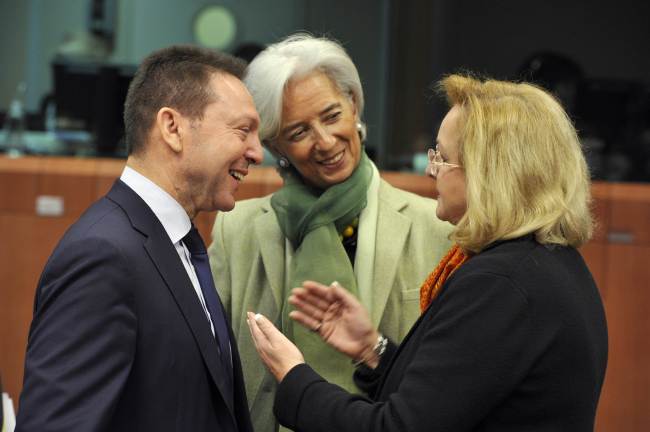BRUSSELS (AP) ― Cash-strapped Cyprus secured a 10 billion euros ($13 billion) bailout package from its European partners and the International Monetary Fund in a bid to prevent the island nation from entering a bankruptcy that could rekindle the region’s debt crisis, officials said early Saturday.
In a major departure from established policies, the package foresees a one-time levy on the money held in bank accounts in Cyprus. Analysts have warned that making depositors take a hit threatens to undermine investors’ confidence in other weaker eurozone economies and might possibly lead to bank runs.
In return for the rescue loans, Cyprus will trim its deficit, significantly shrink its troubled banking sector, raise taxes and privatize state assets, said the Netherlands’ Jeroen Dijsselbloem, president of the Eurogroup meetings of the 17-nation eurozone’s finance ministers.
 |
(From left) Greek Finance Minister Ioannis Stournaras, International Monetary Fund Managing Director Christine Lagarde and Austrian Federal Finance Minister Maria Fekter talk prior to a eurozone meeting at the EU headquarters in Brussels on Friday. (AFP-Yonhap News) |
“The assistance is warranted to safeguard financial stability in Cyprus and the eurozone as a whole,” he said, briefing reporters after almost 10 hours of negotiations.
People with less than 100,000 euros in their Cypriot bank accounts will have to pay a one-time tax of 6.75 percent, those owning more money will lose 9.9 percent. The measure will be carried out early next week and is expected to net 5.8 billion euros in additional revenues, Dijsselbloem added, thereby greatly reducing the country’s financing need.
“We found it justified in terms of burden sharing to also involve the depositors,” said Dijsselbloem, noting that it was a “unique measure” because of Cyprus’ outsized banking system.
“As it is a contribution to the financial stability of Cyprus, it seems just to ask a contribution of all deposit holders,” Dijsselbloem added.
Analysts have warned that imposing such a drastic measure could be seen as a watershed moment, undermining the eurozone’s credibility. Although the leaders stressed the levy was a unique measure for Cyprus, they said the same when private holders of government bonds were forced to accept losses in Greece.
The measure therefore risks scaring investors in Europe’s weaker economies, which could lead them to move their deposits to more stable eurozone countries like Germany. In that case, banks in southern Europe’s economies might be considerably weakened and could possibly require new bailouts. That could then weaken the respective governments, which might then need further assistance from their eurozone partners ― possibly setting off a vicious spiral.
But Joerg Asmussen, a member of the European Central Bank’s governing council, sought to dismiss fears of bank troubles stemming from the levy, saying the ECB stands ready to provide financial institutions with emergency liquidity assistance.
“The levy, it’s an appropriate tool. It’s really tailor-made to the situation in Cyprus,” he said. “It’s a country in extreme financing need, and what you do is to expand the tax base, not only to residents but also to non-residents,” he said.
Russian citizens are estimated to have at least 20 billion euros in deposits in Cyprus.
Asmussen stressed that there was no risk of such a levy being implemented in other countries that have already received bailouts, such as Greece, Ireland or Portugal, because those countries’ financing needs are covered by their international rescue loans.
In a sign of how exceptional and urgent a decision the one-time levy is, Cypriot banks are already implementing measures to make sure that depositors cannot withdraw money to shrink the tax basis, Asmussen said. The remainder of their holdings can be withdrawn, he added.








![[Weekender] Korea's traditional sauce culture gains global recognition](http://res.heraldm.com/phpwas/restmb_idxmake.php?idx=644&simg=/content/image/2024/11/21/20241121050153_0.jpg)